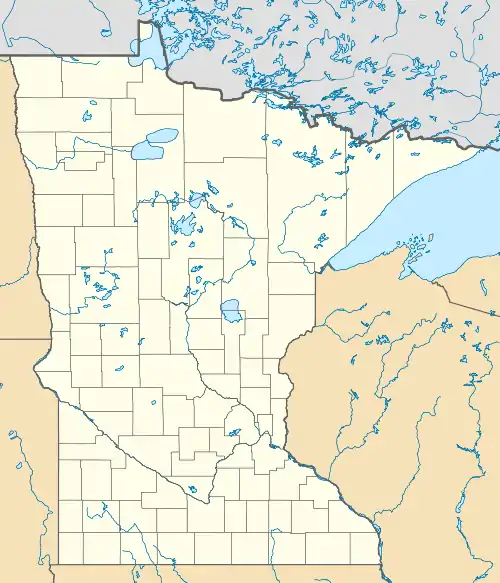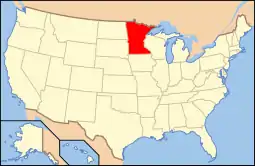First Congregational Church of Clearwater
The First Congregational Church of Clearwater (also known as Clearwater Gospel Tabernacle) is a historic church building in Clearwater, Minnesota, United States, built in 1861. It was listed on the National Register in 1979 for having local significance in the themes of architecture and exploration/settlement.[2] It was nominated for its Greek Revival architecture, association with the area's New England settlers, and connection to the "Indian Scares" of 1862 and 1863.[3] After the Dakota War of 1862 and the murder of a Wright County family a year later, area settlers feared further Native American attacks, prompting a third of the Euro-American population to move away permanently. In Clearwater the remaining residents selected their largest and most defensibly sited building—the church—as a potential refuge. It was outfitted with a stockade and a cache of provisions until the passage of several months proved the settlers' fears unwarranted.[3]
First Congregational Church of Clearwater | |
 The First Congregational Church of Clearwater from the east | |
  | |
| Location | 405 Bluff Street, Clearwater, Minnesota |
|---|---|
| Coordinates | 45°25′10″N 94°3′4″W |
| Area | Less than one acre |
| Built | 1861 |
| Architectural style | Greek Revival |
| MPS | Wright County MRA |
| NRHP reference No. | 79001260[1] |
| Added to NRHP | December 11, 1979 |
See also
References
- "National Register Information System". National Register of Historic Places. National Park Service. July 9, 2010.
- "First Congregational Church". Minnesota National Register Properties Database. Minnesota Historical Society. 2009. Retrieved 2015-06-18.
- Hackett, John J. (April 1978). "Minnesota Historic Properties Inventory Form: First Congregational Church of Clearwater". National Park Service. Retrieved 2015-06-18. Cite journal requires
|journal=(help)

